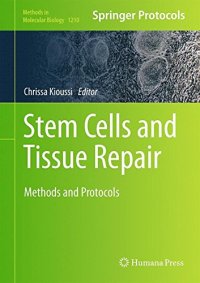
Ebook: Stem Cells and Tissue Repair: Methods and Protocols
Author: Chrissa Kioussi (eds.)
- Genre: Biology // Molecular
- Tags: Cell Biology, Stem Cells
- Series: Methods in Molecular Biology 1210
- Year: 2014
- Publisher: Humana Press
- Edition: 1
- Language: English
- pdf
Stem Cells and Tissue Repair: Methods and Protocols presents in-depth methods for the three major approaches of rejuvenating an aging or sick body: latent regenerative capacity stimulated in a targeted way, replacement organs grown de novo and surgically implanted, and tissue surgically implanted and coaxed to integrate and restore problem areas. The first approach taps into the latent regenerative capacity of particular tissues, such as muscle, skin, fat, or bone marrow. The second approach induces and grows pluripotent stem cells, drives their differentiation along certain pathways such as germ layers, neural crest, liver, teeth or retina, and cultures organs such as pancreas and heart. While the third approach involves various engraftment techniques for neural tissue. Written in the successful Methods in Molecular Biology series format, chapters include introductions to their respective topics, lists of the necessary materials and reagents, step-by-step, readily reproducible protocols, and notes on troubleshooting and avoiding known pitfalls.
Authoritative and easily accessible, Stem Cells and Tissue Repair: Methods and Protocols provides state-of the-art methods descriptions and the references therein that will provide a suitable starting point for exploring the vast literature that has already developed for regenerative medicine.
Stem Cells and Tissue Repair: Methods and Protocols presents in-depth methods for the three major approaches of rejuvenating an aging or sick body: latent regenerative capacity stimulated in a targeted way, replacement organs grown de novo and surgically implanted, and tissue surgically implanted and coaxed to integrate and restore problem areas. The first approach taps into the latent regenerative capacity of particular tissues, such as muscle, skin, fat, or bone marrow. The second approach induces and grows pluripotent stem cells, drives their differentiation along certain pathways such as germ layers, neural crest, liver, teeth or retina, and cultures organs such as pancreas and heart. While the third approach involves various engraftment techniques for neural tissue. Written in the successful Methods in Molecular Biology series format, chapters include introductions to their respective topics, lists of the necessary materials and reagents, step-by-step, readily reproducible protocols, and notes on troubleshooting and avoiding known pitfalls.
Authoritative and easily accessible, Stem Cells and Tissue Repair: Methods and Protocols provides state-of the-art methods descriptions and the references therein that will provide a suitable starting point for exploring the vast literature that has already developed for regenerative medicine.